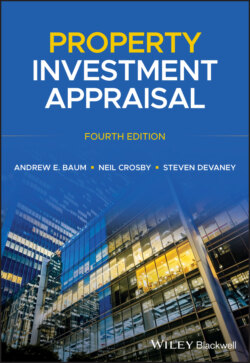Читать книгу Property Investment Appraisal - Andrew E. Baum - Страница 11
1.2 The Appraisal Process
ОглавлениеAppraisals play an important role in the functioning of the property market. They are used in financial statements, for performance measurement purposes, in the bank lending process, and for guiding decisions in relation to acquisition, sale, and asset management.
In financial statements, performance measurement, and for buy/sell decisions, it is important to be able to identify the most likely selling price (Market Value). For instance, banks will wish to know the current Market Value when deciding how much to lend against a property, which might have to be sold to pay off the loan in the event of borrower default. These sources of instruction have been dominant, with the result that appraisals are usually assumed to be market valuations. For some appraisers or valuers, this is the only valuation basis they use and understand.
However, a market valuation is of limited use. It identifies the most likely selling price of a property at a particular time and has no real shelf life (though some court decisions have suggested a three- or six-month lifespan). It cannot be used to identify mispricing, for example in the run-up to the global financial crisis when US homes were clearly over-valued. As a result, market valuation is not a useful tool in the analysis of markets.
Market Value relies specifically on the best evidence of trading prices of other similar assets. This doctrine is underpinned by the courts and by the perceived best practice of competent practitioners. ‘Other similar assets’ is invariably interpreted as other similar property assets. The use of transactions in similar properties raises issues regarding similarities in physical structure, location quality, and lease arrangements. Some of this text relates to how appraisers or valuers can make better use of comparable material in market valuations.
However, more sophisticated investors and increasing regulatory requirements have led to major changes in the level of advice required from valuers and valuations. Over the last 40 years, this need for more detailed advice within both valuation calculations and reports has required valuers to extend their skills. The need to consider Investment Values and, more recently, sustainable values, reflects this change.
The price paid in the market might not represent Investment Value, the value of a property to any individual investor. This value usually needs to be identified. For example, what is a prospective purchaser's subjective perception of what they should receive in return from ownership of a property asset? The investment appraisal requires an assessment of the likely income produced by the property into the future over a likely holding period (which could be different for different purchasers), set against the cost of acquiring, maintaining, and enhancing the asset. The most widely used approach to this is a discounted cash flow; the information requirements and other technical issues concerning cash flow valuation are discussed in Chapter 3.
